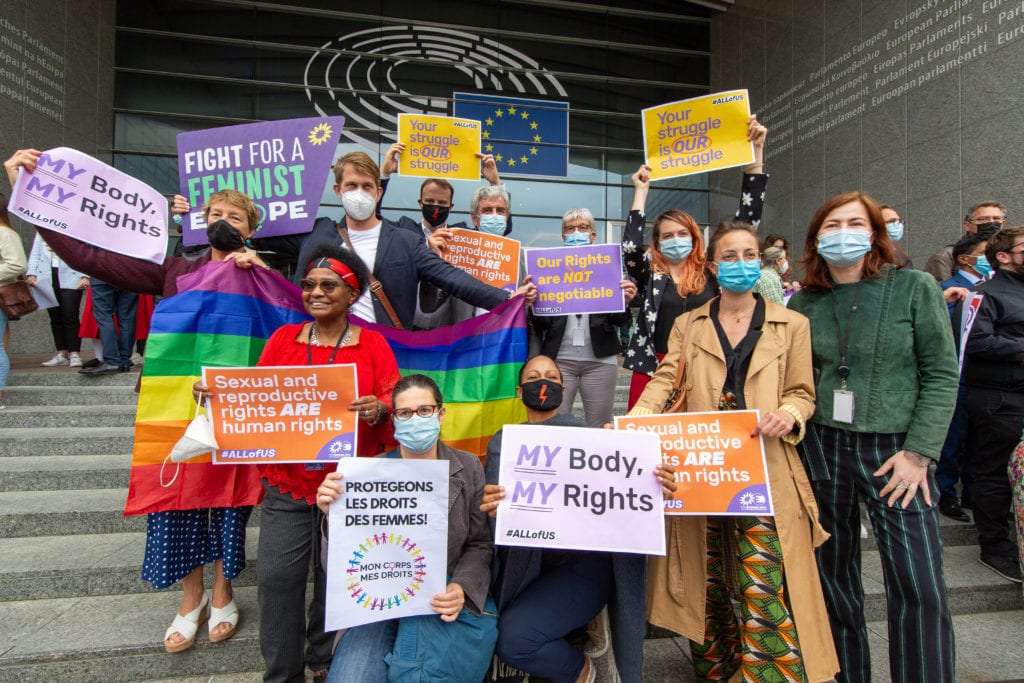European Parliament Votes to Condemn Texas Abortion Ban
Denouncing the Texas law as “a strong attack on women’s freedom,” the European Parliament passes an “urgency resolution” and calls on the U.S. to protect abortion access.

Joining vocal condemnation of Texas’s extreme abortion ban, the European Parliament on October 6 adopted an urgency resolution condemning the law, S.B. 8, which went into effect on September 1. The law bans all abortion care after approximately six weeks of pregnancy – before most know they’re pregnant – and has ended most abortion access in the state.
Read about the Center’s case challenging the Texas abortion ban.
The “European Parliament resolution on the state law relating to abortion in Texas, USA,” passed 381 to 253 with 36 abstentions, strongly rebukes the Texas law and calls on both the state of Texas and the U.S. government to take action to protect abortion rights and access.
The resolution widely denounces the Texas law, claiming that it “de facto amounts to a total ban on abortion,” particularly due to its lack of exception in cases of “rape, incest, or fetal health conditions incompatible with sustained life after birth.” The resolution affirms that sexual and reproductive rights are human rights and argues that the law “flagrantly violates” women’s rights under the U.S. Constitution. Concern is also expressed for the law’s disproportionate impact on people such as those living on low-incomes and in rural areas, Black, Indigenous, and other people of color, members of the LGBTQ+ community, and other populations who experience systemic discrimination and who are now more likely to face financial and/or logistical barriers to legal abortion access.
“We applaud the European Parliament for taking action to condemn Texas’s extreme abortion ban, which is a clear violation of international human rights,” said Risa Kaufman, U.S. Human Rights Director at the Center for Reproductive Rights. “This action—together with the ban’s denunciation by UN human rights experts last month—reflect powerful international condemnation of S.B. 8 and retrogression on abortion rights in the United States. It is a strong statement regarding human rights protections for abortion access.” The UN human rights experts called the Texas ban a violation of international law.
Retrogression on U.S. Abortion Rights
Human Rights and the Fight Against Retrogression in the U.S.
“Human rights experts and the global community are taking notice” of the U.S. retrogression on abortion rights, says Risa E. Kaufman, the Center’s Director, U.S. Human Rights, in this piece for Sexual and Reproductive Health Matters (SRHM).
Urgency Resolutions Issued Only for Grave Human Rights Situations
The European Parliament adopts urgency resolutions in response to pressing human rights situations of grave concern in countries outside the European Union. Urgency resolutions are important political statements that reflect the position of the European Parliament and often include calls on national authorities and EU institutions to address the situation through foreign policy tools and action. Notably, these resolutions are rarely used in relation to Western democracies or in relation to reproductive rights concerns. The Texas ban is of grave concern, the resolution argues, and a “strong attack on women’s freedom.”
The Center has been advocating for strong EU action in response to regression on sexual and reproductive rights around the world. “We believe that EU action in response to efforts to roll back protections for sexual and reproductive rights – no matter where they occur – is critical,” said Katrine Thomasen, the Center’s Europe Senior Legal Adviser. “Human rights law is unequivocal that retrogression on sexual and reproductive rights is not acceptable and such attempts must be denounced and rejected by EU institutions in the strongest possible terms as contrary to EU values and human rights standards,” added Thomasen.
More on the Center’s work at the EU.
Resolution Calls for Action by Texas, the U.S., and the EU
The European Parliament resolution expressly calls on both the governments of Texas and the U.S. to take action to protect abortion rights and access. Specifically, it urges Texas to repeal S.B. 8 and ensure that “safe, legal, free, and good quality abortion services” are available and easily accessible to all women and girls in the state.
The resolution requests that the U.S. federal government establish legal protections for universal access to abortion, stressing that health care is a human right and the state is obligated to provide accessible health care to all. It calls on the U.S. Congress to pass the Women’s Health Protection Act (WHPA), which safeguards abortion access from state-level bans and restrictions. WHPA – a bill that the Center has long advocated for — was recently passed in the House of Representatives in an historic vote, but still needs to be considered by the Senate.
The resolution calls on the EU to take several actions, including denouncing S.B. 8 in communications with US officials, monitoring the protection of SRHR in the U.S., and asking EU member states to offer financial and other support to U.S.-based civil society organizations protecting SRHR and those offering safe haven for medical professionals who might be a risk of legal or other harassment as a result of their work.
Both the UN experts and the European Parliament agree that the backsliding in women’s rights, and sexual and reproductive health rights in particular, endangers lives and is an issue of grave importance that must be urgently addressed by national and international governing bodies.
More About the Texas Abortion Ban
Texas law S.B. 8 prohibits abortion care after approximately six weeks of pregnancy and incentivizes individuals—including anti-abortion activists—to seek monetary penalties of at least $10,000 by suing anyone who provides an abortion or assists someone in obtaining one after the law’s limit. The law was enacted in direct violation of Roe v. Wade and was designed to skirt judicial review.
The ban went into effect on September 1 and ended most abortion care in the state. It was temporarily blocked by a federal district court on October 6 in a case brought by the Department of Justice, but on October 8 the Fifth Circuit Court of Appeals lifted the injunction and allowed the law to again take effect.
The Center for Reproductive Rights is challenging the Texas ban in two cases: Whole Woman’s Health v. Jackson et al. was filed in July in an attempt to block the law before taking effect; and Braid v. Stilley was filed in October defending a Texas physician who violated the ban.
Read more about the Center’s cases challenging the Texas law here:



